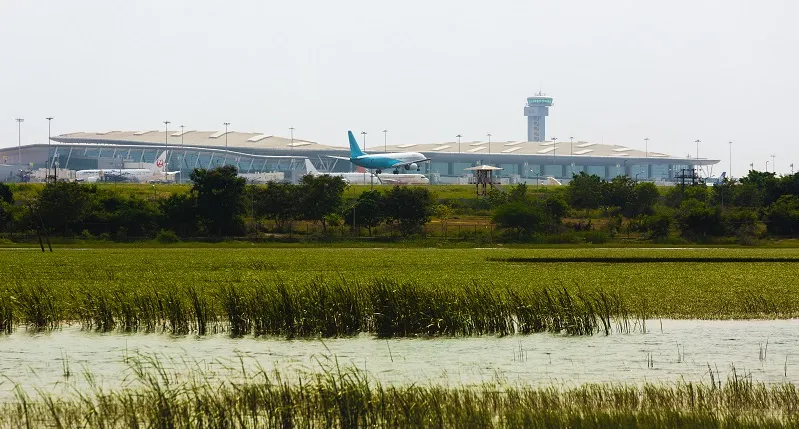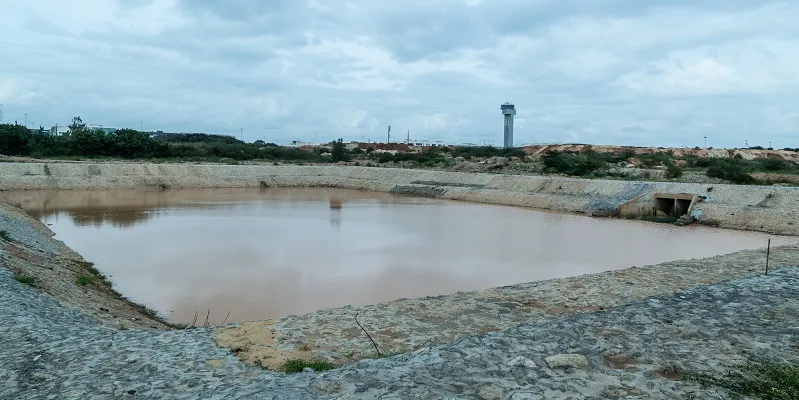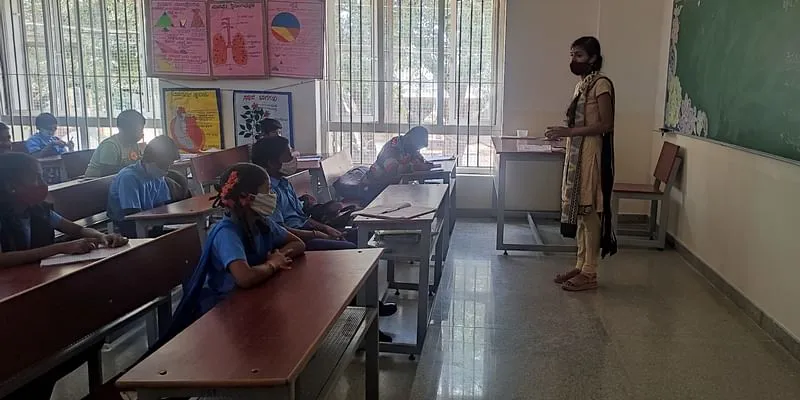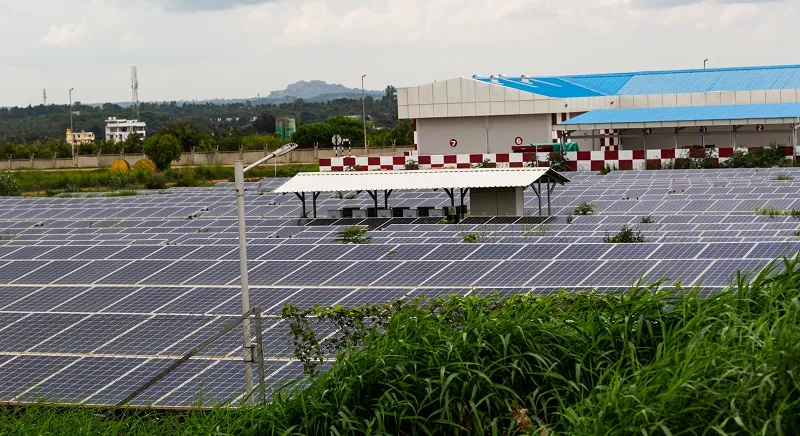How Bengaluru’s Kempegowda International Airport is working towards becoming sustainable and energy-efficient
The airport has initiated several flagship programmes to create social values for all its stakeholders. Bengaluru International Airport Limited (BIAL) also addresses issues including education, water and sanitation, health and conservation of arts and culture.
Kempegowda International Airport (KIA/BLR Airport), which is operated by Bengaluru International Airport Limited (BIAL), is an international airport serving Bengaluru. Spread over 4,000 acres, it is India’s third-busiest airport – both in terms of passenger traffic and aircraft movement.
Since its inception in 2008, BLR Airport has become a key contributor to the regional as well as national economies. In its 13-year-long journey, the airport has welcomed more than 230 million passengers, oversaw two million air traffic movements, and has processed 3.5 million metric tonnes of cargo.

Bettakote Lake on the Airport boundary
BIAL oversees the operations at the airport. Apart from taking care of passengers and staff, BIAL says it is also committed to working towards a sustainable future by creating a culture where employees, the surrounding community, and the society at large are actively involved in improving the quality of their lives.
BIAL’s sustainability and Corporate Social Responsibility (CSR) strategies are focused on contributing to the well-being of communities living around the 4,000-acre airport campus.
In a conversation with SocialStory, Hari Marar, MD and CEO, BIAL talks about the key activities that his team is focused on to ensure sustainability.
“We aim to take our sustainability initiatives to a whole new level with a vision to touch lives by nurturing a sustainable future through initiatives that drive economic, social and environmental transformation. We are conscious about taking all the necessary steps in ensuring that our growth is sensitive to the environment and economic needs of the surrounding communities,” says Hari.
Developing water resources
BIAL has initiated several flagship programmes to create social values for all its stakeholders. These programmes address issues including education, water and sanitation, integrated development, health and wellbeing, and conservation of arts and culture.
It also ensures that all vendors/concessionaires align their business according to BIAL’s sustainability principles and green procurement policies/initiatives.
All community initiatives by BIAL are implemented by the Kempegowda International Airport Foundation (KIAF), which will also handle the special purpose entity’s CSR and Corporate Environmental Responsibility initiatives in the coming years.

Rain water harvesting pond within the airport campus
Water is a scarce resource in the Bengaluru Rural district where BLR Airport operates. The region was categorised as an over-exploited area – where the rate of extraction from aquifers exceeds the recharge rate. Hence, in alignment with the UN Sustainable Development Goals, the airport claims to have framed a roadmap to achieve for the next decade.
As part of its efforts, BIAL aims to consume water responsibly to replenish water bodies; adapt to renewable energy to nourish cleaner and greener earth; build a serene environment of minimised noise and chaos; maintain the balance of nature through the use of natural resources, reduce waste through recycling and reuse; lay the path to a greener future by opting for sustainable mobility choices; and partner with communities to create a future that is better and brighter.
“The BLR Airport campus became water positive from 2019. This means the rate of replenishment is more than the consumption rate. For every litre consumed, 1.37 litres of water is replenished. Initiatives like ground recharge, lake recharge and integrated management of liquid and solid waste to avoid groundwater contamination have improved water resources,” Hari explains.
BIAL installed low-water consumption fixtures across washrooms in the Terminal building and deployed a weather-based Smart Automatic Irrigation System to manage its sprawling 100-acre landscape.
This first-of-its-kind weather-based Smart Automatic Irrigation System can be controlled from an app on a mobile phone. It irrigates plants based on the calculation of various parameters, including evapotranspiration, soil moisture and weather conditions.
Access to safe drinking water had become a challenge for the community around the airport. This resulted in BIAL installing rooftop rainwater harvesting units in five villages surrounding the airport to provide safe drinking water for the community, impacting more than 300 families.
“Under our flagship CSR programme ‘Namma Ooru’, we have planted and nurtured about 500 pomelo plants at a location that was once a hub for pomelos before the construction of the airport. This will not only help conserve the rare indigenous fruit, but also contribute towards carbon reduction. Over the next few years, the airport campus will be home to largest pomelo orchard,” adds Hari.
Education initiatives
“Our flagship CSR educational programme Namma Shikshana (our education), was launched during FY 2017-18. From the following year, we started to see the result of our efforts. Our sustainability journey began from the day foundation stone was laid to build India’s first greenfield public-private partnership airport,” says Hari.
BIAL has rebuilt five government schools, refurbished six schools with additional facilities, and 21 anganwadis received infrastructure upgrades. The schools are claimed to be equipped with renewable energy sources and have provisions for rainwater harvesting, as a part of BIAL’s sustainability initiatives. A brand-new library surrounded by lush green gardens forms an integral part of a conducive learning environment.

BIAL has rebuilt five government schools, refurbished six schools with additional facilities, and 21 anganwadis received infrastructure upgrades.
In addition to infrastructure upgrades, BIAL supported a unique programme providing focused training for slow learners studying in government and government-aided high schools of Bengaluru Rural district. This made a deeper impact as Bengaluru Rural district rose to the second position – from 14th – in the overall SSLC ranking in Karnataka in the last two years.
To support talented and deserving students, BIAL provided scholarships for over 200 students for higher education.
As part of the programmatic interventions, BIAL works with the Government of Karnataka to complement initiatives by providing breakfast to 3,000 children every day, learning kits for students, engaging 50 full-time subject resource experts, and promoting sports and co-curricular activities among students.
In 2018-19, as many as 261 students benefited from the BIAL Scholarship that was introduced to motivate talented students from five panchayats around the airport and support their pursuit of quality education from pre-university to post-graduation and beyond. Students were shortlisted based on their ambitions and aspirations, as well as academic records. The objective was to lower the school dropout rate that occurred due to the lack of financial resources.
Becoming energy neutral
Airports operate around the clock and are constantly looking for ways to source power to keep their energy-hungry operations on track. With a focus on energy consumption and its impact on climate change, BIAL implemented various measures to reduce its impact on the environment.
Last year, the airport announced that it achieved the goal of becoming net energy neutral during FY2020-21; saving 22 lakh units of energy, enough to power nearly 9,000 houses for a month.

A combination of onsite solar plants, as well as offsite (open access) solar and wind power PPAs, are generating 70 million units/annum to meet the airport’s requirements. It largely consumes 100 percent renewable electricity, leading to the elimination of >50,000 MT of CO2 emissions per annum.
Kempegowda International Airport claims to be one of the leading players in the Airport Carbon Accreditation initiative, launched by ACI Europe, which has become a global benchmark for airports. The airport has retained the Carbon Accreditation Level 3+ from ACI and is working towards upgrading our ACI accreditation to Level 4+ by FY 2022-23.
Edited by Kanishk Singh


![[Sustainability Agenda] How The Living Greens is bringing organic farming to urban spaces](https://images.yourstory.com/cs/5/54bfb360112e11ecbdb4b127003811f4/CopyofImageTagsEditorialTeamMaster-1633525226159.jpg?fm=png&auto=format&h=100&w=100&crop=entropy&fit=crop)





